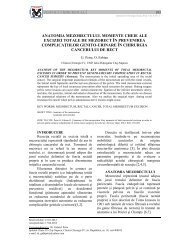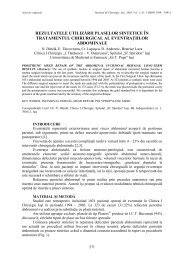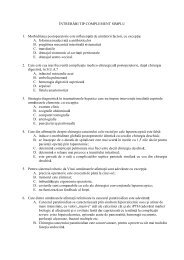Full text PDF (3.9MB) - Jurnalul de Chirurgie
Full text PDF (3.9MB) - Jurnalul de Chirurgie
Full text PDF (3.9MB) - Jurnalul de Chirurgie
You also want an ePaper? Increase the reach of your titles
YUMPU automatically turns print PDFs into web optimized ePapers that Google loves.
Articole <strong>de</strong> sinteză <strong>Jurnalul</strong> <strong>de</strong> <strong>Chirurgie</strong>, Iaşi, 2008, Vol. 4, Nr. 2 [ISSN 1584 – 9341]<br />
Valproic acid - inhibit histone dyacetylase and promote re differentiation, NIS<br />
expression, iodi<strong>de</strong> uptake and is a growth suppression agent in poorly differentiated thyroid<br />
carcinoma cells [17]. Retinoids may be associated with histone <strong>de</strong>acetylase inhibitors (Cras A<br />
2007, quoted by Zanoti-Fregonara P [1]).<br />
Gene therapy - a<strong>de</strong>novirus – mediated in vivo NIS transfer is directed to introduce NIS<br />
co<strong>de</strong> into less differentiated thyroid carcinoma in or<strong>de</strong>r to induce or enhance iodine<br />
avidity [15].<br />
Classical chemotherapy has a little or no role in the management of advanced<br />
differentiated thyroid cancer. It is restricted to patients with progressive disease, uncontrolled<br />
by surgery and 131 iodine therapies [7].<br />
Studies with chemotherapy in radioresistant DTC are limited.<br />
Single agent doxorubicin or a combination of doxorubicin and cysplatin provi<strong>de</strong> a 10-<br />
20% partial and transient response without impact on prolonged survival in patients with<br />
metastatic DTC [7]. Combined therapy with bleomicin (30mg/day for 3 days), adriamicin<br />
(60mg/m 2 day 5, cisplatinum 60 mg/m 2 day 5 produced a transient response in some cases [18].<br />
Doxorubicin in association with interferon beta was tried in advanced non-medullary thyroid<br />
cancer with mo<strong>de</strong>st antitumor activity but increased toxicity [19].<br />
Combined chemotherapy using carboplatin and epirubicin un<strong>de</strong>r THS endogenous or<br />
exogenous stimulation <strong>de</strong>monstrated a rate of complete and partial response of 37% of cases<br />
and 81% of patients remain with stable disease [20].<br />
Novel therapies in (clinical) trials for DTC<br />
New insights on the genetic and molecular pathogensis of cancers, including thyroid<br />
cancer allowed the <strong>de</strong>velopment of new therapies targeting the mechanisms involved in thyroid<br />
cancer <strong>de</strong>velopment. These therapies are in different phases of in vitro and in vivo trials with<br />
promising results. Target therapy, a new generation of anticancer therapy, is <strong>de</strong>signed to<br />
interfere with specific molecular targets which are genes or their protein products believed to<br />
play a crucial role in cancer biology: aggressive behaviour, metastatic spread, loss of iodine<br />
uptake ability and resistance to conventional therapies.<br />
These therapies are grouped in the following categories [21]: oncogene inhibitors,<br />
angiogenesis inhibitors, modulators of growth or apoptosis, other targeting therapies. Most<br />
agents presented later are being testes in vitro, on xenografts mo<strong>de</strong>ls and some of them are now<br />
in clinical trials [22].<br />
1. Oncogene inhibitors<br />
Tyrosine kinase inhibitors target the activated RET/PTC oncogene, responsible for a<br />
proportion of PTCs. PTC <strong>de</strong>velopment is associated with RET/PTC rearrangements that occur<br />
in 2.5 to 40% of cases, most of them in radiation-induced PTCs. RET/PTC was also noticed in<br />
Hurthle cell carcinoma. Constitutive activation of RET is responsible for sporadic and<br />
hereditary MTC (FMTC, MEN 2A and MEN 2B). Thus, there is rationale to try RET inhibitors<br />
in different forms of thyroid cancers [23].<br />
Inhibitors of RAS, RAF, and MEK kinase target various members of the signaling<br />
pathway for RET action.<br />
RET tyrosine kinase inhibitors in DTC and MTC:<br />
- Imatinib was proven to be well tolerated but induces only a transient stable disease<br />
when used in advanced MTC [24];<br />
82

















